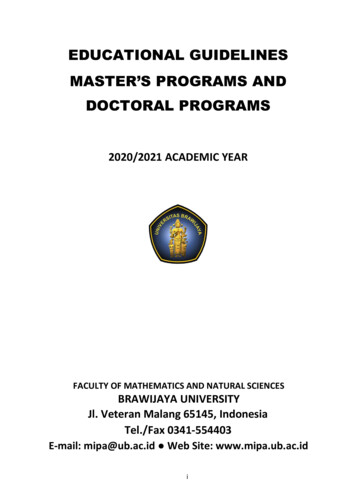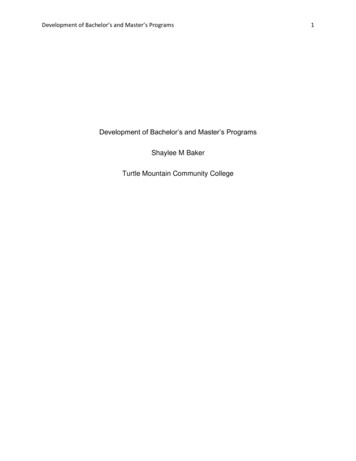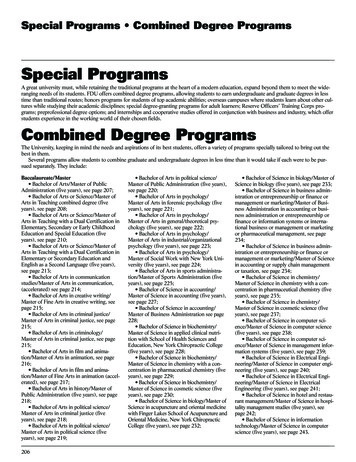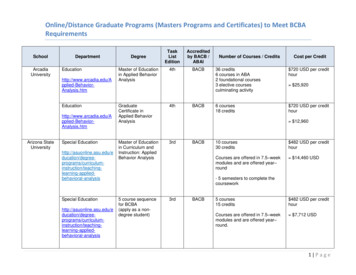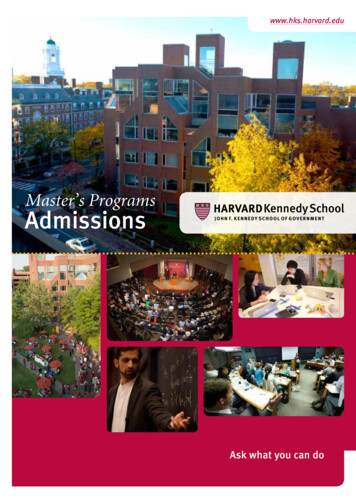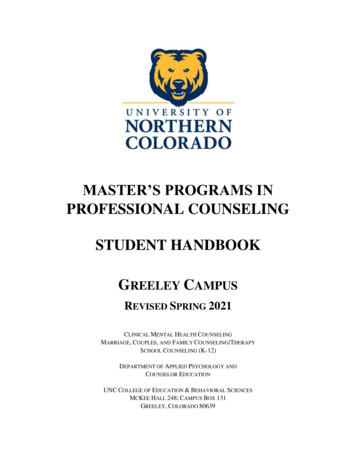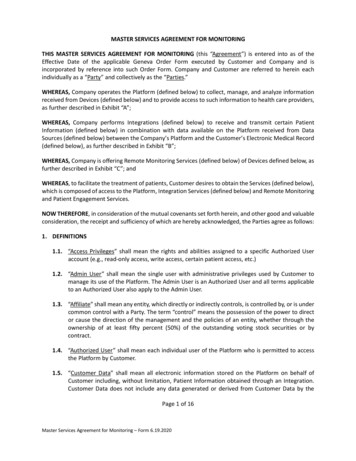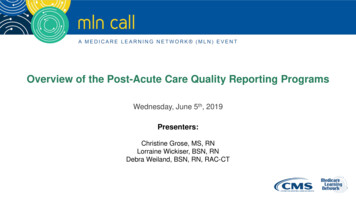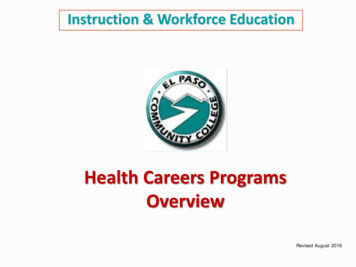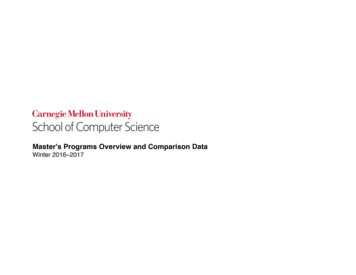
Transcription
Master's Programs Overview and Comparison DataWinter 2016–2017
ShortnameSchool of Computer Science Master's Programs & HandbookLinkApplyLinkDegreeDepartmentPartner Dept/CollComputational BiologyMSCBApplyMaster of ScienceComputational Biology Dept (CBD)BiologyComputer ScienceMSCSApplyMaster of ScienceComputer Science Dept (CSD)Machine LearningMSMLApplyMaster of ScienceMachine Learning Dept (MLD)Human-Computer InteractionInstitute (HCII)Robotics Institute (RI)MHCIApplyMETALSApplyRoboticsRobotic System DevelopmentRIMSMRSDApplyApplyMaster of Human-ComputerInteractionMaster of EducationalTechnology and AppliedLearning ScienceMaster of ScienceMaster of ScienceComputer VisionMSCVApplyMaster of ScienceMLTApplyMaster of ScienceBiotechnology Innovation and ComputationMSBICApplyMaster of ScienceComputational Data Science AnalyticsComputational Data Science SystemsHuman-Centered Computational Data ScienceMCDSApplyMaster of Computational DataScienceIntelligent Information SystemsMIISApplyMaster of ScienceSoftware EngineeringMSEApplyMaster of Software EngineeringInformation Techn., Software EngineeringMSIT-SEApplyMaster of ScienceInformation Techn., Embedded SoftwareEngineeringMSIT-ESEApplyMaster of ScienceMITSApplyMaster of InformationTechnology StrategyInstitute for Software Research(ISR)MSIT-EBIZApplyMaster of ScienceInstitute for Software Research(ISR)MSIT-PEApplyMaster of ScienceInstitute for Software Research(ISR)Human-Computer InteractionEducational Techn. and Applied LearningScienceLanguage TechnologiesInformation Techn. StrategyInformation Techn., eBusiness TechnologyInformation Techn., Privacy EngineeringHuman-Computer InteractionInstitute (HCII)Robotics Institute (RI)Robotics Institute (RI)Language Technologies Institute(LTI)Language Technologies Institute(LTI)Language Technologies Institute(LTI)Language Technologies Institute(LTI)Institute for Software Research(ISR)Institute for Software Research(ISR)Institute for Software Research(ISR)Awards, Honors, DistinctionsCarnegie Mellon and Tsinghua Universities Renew Dual-DegreeMastersNew Master's degree from world's first PhD program in MachineLearning.World's first professional program for human-computerinteraction, user experience design and user-centered research.Psychology100% Career Placement Every YearTepper School of BusinessRanked #1 by Grad School Hub for Robotics masters programsFirst-of-its-kind Professional Masters Program in ComputerVision; eighteen industry sponsored capstone projects in the firsttwo cohorts.MLT graduates win multiple paper awards, for example at ACL2016Computational BiologyMSBIC student named a James R. Swartz Entrepreneurial FellowComputer ScienceHuman Computer InteractionTop honors in Automated Question-Answering Competition andFacebook global hackathonMSE students are recipients of Siebel Scholarships and foundersof numerous start-up companies.MSIT-SE students won top prize in 2015 Harvard Medical Schoolsponsored hackathon.Unique specialized program at the intersection of hardware andElectrical and Computer Engineeringsoftware engineeringElectrical and ComputerEngineering; Humanities and Social Capstone project resulted in U.S. cyber operations research inSciencesthe area of the Law of Armed Conflict.2016 Practicum Competition awards 36,000 to winning studentprojects.World's first-of-its kind program responding to the rapidlyCollege of Engineeringgrowing need for technical privacy expertise. Winner of a 2016Top Privacy Paper for Policymakers.Tepper School of Business
TypicalTypical Pattern of OnSemesterscampus Semestersof g ptProvidingCoursesFall, Spring, Fall, SpringFall, Spring, FallFall, Spring, Fall111N/AN/AProject65% CSD69% MLD15% MLD18% CSD5% LTI9% STATS3Fall, Spring, Summer0Capstone80% HCII12% Design1% CSDMichael BettBJ FecichSarah ConteSarah Conte34330011CapstoneThesisCapstoneCapstone81% HCII75% RI73% RI67% RI14% Psych12% MLD9% TSB33% MLD3% Design5% CSD7% HCRobert FrederkingKate Schaich40N/A70% LTI22% MLD3% CSDJohn VuCharles Burger4Fall, Spring, SummerFall, Spring, Fall, SpringFall, Spring, FallFall, Spring, FallFall, Spring, Summer, Fall,Spring, SummerFall, Spring, Fall, Spring1Capstone45% LTI40% CBD7% MLDEric NybergJennifer Lucas3Fall, Spring, Fall1Capstone50% CSD30% LTI16% MLDTeruko MitamuraAnthony LattanzeAnthony LattanzeAnthony LattanzeDavid GarlanMichael ShamosNorman Sadeh, LorrieCranorKate SchaichLauren MartinkoLauren MartinkoLinda SmithLinda SmithAmber Vivis343433Fall, Spring, FallFall, Spring, Summer, FallFall, Spring, SummerFall, Spring, Summer, FallFall, Spring, SummerFall, Spring, neCapstone63% LTI80% ISR76% ISR44% ISR19% INI95% ISR24% MLD9% CSD7% CSD34% ECE17% ISR2% CSD7% CSD2% TSB7% IS10% CSD13% CSD1% HCIITiffany Todd3Fall, Spring, Summer0Capstone85% ISR5% CSD3% HCIIGarth GibsonAngela MillerSchool of Computer Science Master's ProgramsProgram DirectorProgram AdministratorComputational BiologyComputer ScienceMachine LearningChristopher LangmeadKarl CraryWilliam CohenNicole StengerTracy FarbacherDorothy Holland-Minkley433Human-Computer InteractionSkip ShelleyNicole WillisEducational Techn. and Applied Learning ScienceRoboticsRobotic System DevelopmentComputer VisionKen KoedingerGeorge KantorJohn DolanSrinivasa NarasimhanLanguage TechnologiesBiotechnology Innovation and ComputationComputational Data Science AnalyticsComputational Data Science SystemsHuman-Centered Computational Data ScienceIntelligent Information SystemsSoftware EngineeringInformation Techn., Software EngineeringInformation Techn., Embedded Software EngineeringInformation Techn. StrategyInformation Techn., eBusiness TechnologyInformation Techn., Privacy EngineeringSchool of Computer Science, Dean's OfficeNotes:Individuals can be contacted using our Directory: http://www.cs.cmu.edu/directoryInternships are typically taken away from campus during the Summer semester; some programs feature on-campus summers without classes or tuition, typically involving research.A culminating activity involves more work than most classes, draws on learning from the rest of the program, produces a document and presentation and satisfies a graduation requirement.Departments teaching courses include: Statistics (STATS), Design (Design), Psychology (Psych), Heinz College (HC), Tepper School of Business (TSB)Departments teaching courses include: Information Systems (IS), Electrical and Computer Engineering (ECE), Information Networking Inst (INI)Department providing courses data averaged over 2011-2015.
School of Computer ScienceMaster's ProgramsComputational Biology (MSCB)Computer Science (MSCS)Program GoalProduces elite Computational Biologists who understand how to use computation to model andanalyze complex biological systems and who are prepared for doctoral degrees at top universitiesor industry jobs across the spectrum of pharmaceutical, biotechnology, and biomedical fieldsTo provide students a solid Computer Science core education plus access to a student-customizedcurriculum, thus supporting careers in industry, research labs, and/or further graduate study inComputer Science fieldsAn Example Program Outcome (click for more program learning outcomes)Identify and formulate the algorithmic, analytic, and modeling problems associated with a wide range of research andengineering objectives in Biology by applying knowledge of Computer Science, Machine Learning and Mathematics.Within one or more sub-fields of Computer Science, select, implement, deploy, and/or develop viable solutions to currentand emerging problemsMachine Learning (MSML)To provide students with a solid formal and practical understanding of machine learning, and toprepare them for careers in industry, research labs, or further graduate study.Design and evaluate novel learning algorithmsHuman-Computer Interaction(MHCI)Integrates service and design thinking into a rigorous HCI curriculum that prepares our students todesign and guide the future of human and technology interactions.Envision how emerging technologies such as natural language processing, machine learning, big data and the IoT can beintegrated to engage all human senses and contexts, and beyond visual presentation on a screenEducational Techn. and AppliedLearning Science (METALS)Trains graduate students to apply evidence-based research in learning to create effectiveinstruction and educational technologies within formal and informal settings.Evaluate and improve instructional and assessment solutions using psychometric and educational data mining methodsRobotics (RIMS)Preparing students to take a leading role in the research and development of future generationsof integrated robotics technologies and systems.Formulate an approach to address an open robotics research problem, and develop a solution that matches or exceeds thecurrent state-of-art.Robotic System Development(MRSD)To instill the fundamentals of robotics engineering and teach students the critical systems,technical, and business skills that robotics companies value in their employeesDesign, implement and evaluate robotic systems including mechanical, sensing/electronics, and programming/controlcomponentsComputer Vision (MSCV)Prepare students for careers in the field of computer vision and facilitate hands-on experiencewith real research and development projects addressing current applications of computer vision.Apply, adapt and analyze optical concepts of reflection, refraction, transmission, scattering, polarization, light fields andmethods such as compressive sensing, computational imaging as applied to computer vision problems such as materialunderstanding, geometry estimation and image based renderingLanguage Technologies (MLT)Prepare students to enter top-tier PhD programs in the area of Language Technologies, or startsuccessful careers at the best industrial research labsInterpret, select, and apply current theory, resources, and practice in language technology. This includes the application ofcomputer technology to the analysis and/or production of human languages.Biotechnology Innovation andComputation (MSBIC)To develop successful entrepreneurs who can apply computing technology to disrupt thebiotechnology and healthcare sectors and entering the market as professionals trained in thelatest generation of computational and data engineering technologyDevelop a business model and strategy for the product by integrate all of the acquired learning in the program towards thedevelopment of a formal Minimum Viable Product for demonstrations to Investors, Venture Capitalists, potentialcustomers and prepare to launch their start upComputational Data ScienceAnalytics (MCDS-A)To develop expertise and mastery over the large scale machine learning and data analysistechniques essential to computational data science analyticsDesign, implement and evaluate the use of analytic algorithms on sample datasetsComputational Data ScienceSystems (MCDS-S)To develop expertise and mastery over the large scale parallel and distributed systems essentialto computational data science systemsImplement and evaluate complex, scalable data science systems, with emphasis on providing experimental evidence fordesign decisionsHuman-Centered ComputationalData Science (MCDS-H)To develop expertise and mastery over the human-computer interactions and learningexperience essential to computational data science interpretationDesign, implement and evaluate a user experience prototype for a given user needIntelligent Information Systems(MIIS)For students who want to rapidly master advanced content-analysis, mining, and intelligentinformation technologies prior to beginning or resuming leadership careers in industry andgovernmentDesign, implement and evaluate a software system and machine-learning model on real world data sets at real world scaleSoftware Engineering (MSE)For software developers who have at least two years of experience and want to become technicaland strategic leaders.Apply formal modeling, analysis techniques, and tools to software requirements, design, implementation and validation toensure quality in the software systems produced.Information Techn., SoftwareEngineering (MSIT-SE)For junior software professionals who have at least one year of experience (or equivalentinternship/project experience) and want to enhance their software development and leadershipskillsApply formal modeling, analysis techniques, and tools to software requirements, design, implementation and validation toensure quality in the software systems produced.Information Techn., EmbeddedSoftware Engineering (MSIT-ESE)Provides the foundations and skills in computer science, hardware and electrical engineering, andsystems engineering necessary for effective embedded software engineering.Design software for embedded systems to include: selecting appropriate data structures and algorithms, softwarestructures and patterns, to satisfy systemic functional and quality attribute requirements (e. g. safety, reliability,performance, etc.).Information Techn. Strategy(MITS)To produce leaders with the critical thinking skills and strategic perspective needed to solvechallenges within the information and cyber domains.Apply software architectural principles in the design and implementation of secure computer systems in light of theemerging realm of cyber warfare.Information Techn., eBusinessTechnology (MSIT-EBIZ)Prepares students to play a variety of mission critical roles leveraging the power of technologyacross the enterprise.Electronic Negotiation) Apply basic game and auction theory to real-world markets, create a combinatorial auction forsourcing services, select a market-clearing technology to enable a particular market to function and determine tradeoffsbehind different market designs.Information Techn., PrivacyEngineering (MSIT-PE)To prepare students for jobs as privacy engineers and technical privacy managersAssess privacy-related risk and compliance, devise privacy incident responses, and integrate privacy into the softwareengineering lifecycle phases
ivity25-75%tileQuant. GRE25-75%tileVerbal GRE25-75%tileAnalytic GRE% FemaleComputational BiologyComputer ScienceMachine LearningHuman-Computer InteractionEducational Techn. and Applied Learning ScienceRoboticsRobotic System DevelopmentComputer VisionLanguage TechnologiesBiotechnology Innovation and ComputationComputational Data Science AnalyticsComputational Data Science SystemsHuman-Centered Computational Data ScienceIntelligent Information SystemsSoftware EngineeringInformation Techn., Software EngineeringInformation Techn., Embedded Software EngineeringInformation Techn. StrategyInformation Techn., eBusiness TechnologyInformation Techn., Privacy 29%18%29%33%43%48%39%School of Computer Science Master's l of Computer Science Master's ProgramsNotes:Selectivity is the ratio of student applications offered acceptance over applications received; some programs requirements may diminish qualified candidates significantly.GRE score ranges are 25th percentile to 75th precentile; for example, 25% of the students offered acceptance by CMU had a score below the 25th percentile.GRE quantitative and verbal are scored between 130 and 170 in 1 point increments; GRE analytical is scored between 0 and 6 in 0.5 increments.2012-2015 worldwide GRE quantitative mean score: 152.5 (8.9 standard deviation); verbal mean score: 150.2 (8.5 standard deviation); analytical mean score: 3.5 (0.87 standarddeviation).For precentiles of all test takers, see http://www.ets.org/s/gre/pdf/gre guide table1a.pdfThe scope of % female is the fraction of students offered acceptance by CMU that are female.Combining all SCS master's programs, 4372 people applied and 1012 people were offered acceptance into at least one SCS master's program (23%).Of the 1012 people that were offered acceptance into one or more SCS master's program, 230 had also applied to one or more SCS Ph.D. program (23%).
2016Grads2016Con'tEducComputational Biology16425%Computer ScienceMachine LearningHuman-Computer InteractionEducational Techn. and Applied Learning ScienceRoboticsRobotic System DevelopmentComputer Vision61149781School of Computer Science Master's Programs2016Grads Schools by popularityCon't %20162016Grads Grads Employers by polularityEmpl'd Empl %531%15%50%Harvard, Johns Hopkins,U.PittCMU, U.WashCMU42734%CMU3840718%0%CMU, MITLanguage Technologies241146%Biotechnology Innovation and ComputationComputational Data Science AnalyticsComputational Data Science SystemsHuman-Centered Computational Data ScienceIntelligent Information SystemsSoftware EngineeringInformation Techn., Software EngineeringInformation Techn., Embedded Software EngineeringInformation Techn. StrategyInformation Techn., eBusiness TechnologyInformation Techn., Privacy Engineering41School of Computer Science Master's Programs53563CMU, GaTech, JohnsHopkins0%23%U.Michigan, U.ChicagoMeanSalaryMedianSalaryMaxSalaryMinSalary% Empl'dor Con'tEduc2016 NoInfo56%569%50%Affymetrix, Emerald Therapeutics,U.PittGoogle, Airbnb, MicrosoftTwitter, Google, United Airlines 110,293 110,000 152,500 32,400 131,000 130,00084%100%107390%Draper, Google, NASA 94,965 95,000 135,000 46,00094%2273971%98%CMU, Mine Vision Systems, TijeeApple, Uber, General Motors 101,900 100,000 143,000 65,000 97,429 100,000 140,000 50,00089%98%11146%Amazon, Informatik Service, LendUp92%241100% Amazon, Boeing, IBM 115,949 115,000 135,000 80,000100%6197%Google, LinkedIn, Uber 115,641 115,000 150,000 80,000100%0140%1286%Google, Amazon, Twitter 120,000 115,000 135,000 100,00086%2660%5989%Oracle, Innopolis Univ, AWS 114,732 119,000 180,000 70,00089%4770%6686%Oracle, Amazon, Apple 106,579 110,000 120,000 50,00086%49%44388% 109,30096%3043 180,000 32,400Notes:The above data and more are available in these programs' placement docs: http://www.cmu.edu/career/salaries and destinations/Data last updated September 2016Con't Educ means some graduates continued in another educational program (Ph.D.).Programs too small or too new to be reported: Master of Science in Computer Vision (Robotics Inst.), and Master of Science in Information Technology, Privacy Engineering (Inst of Software Research)Programs closely related and merged to be reportable: Master of Human-Computer Interaction and Master of Educational Technology and Applied Learning Science (both Human-Computer Interaction Inst)Programs closely related: Master of Software Engineering, Master of Information Technology Strategy, Master of Science in Information Technology, Software Engineering and Embedded Software Engineering (Inst of Software Research)Single program with multiple Majors: Master of Computational Data Science, majors in Analytics, Systems and Human-Centered (all Language Technologies Inst)
School of Computer Science, Sample of Master's Programs Learning Outcomes:Computational Biology (MSCB)Explain core concepts, theories, and experimental methods in Genomics, Molecular Biology, Cell Biology, and Systems BiologyIdentify and formulate the algorithmic, analytic, and modeling problems associated with a wide range of research and engineering objectives in B
Carnegie Mellon and Tsinghua Universities Renew Dual-Degree Masters Machine Learning MSML ApplyMaster of Science Machine Learning Dept (MLD) . Information Techn., eBusiness Technology MSIT-EBIZ ApplyMaster of Science Institute for Software Research (ISR) 2016 Practicum Competition awards 36,000 to winning student
